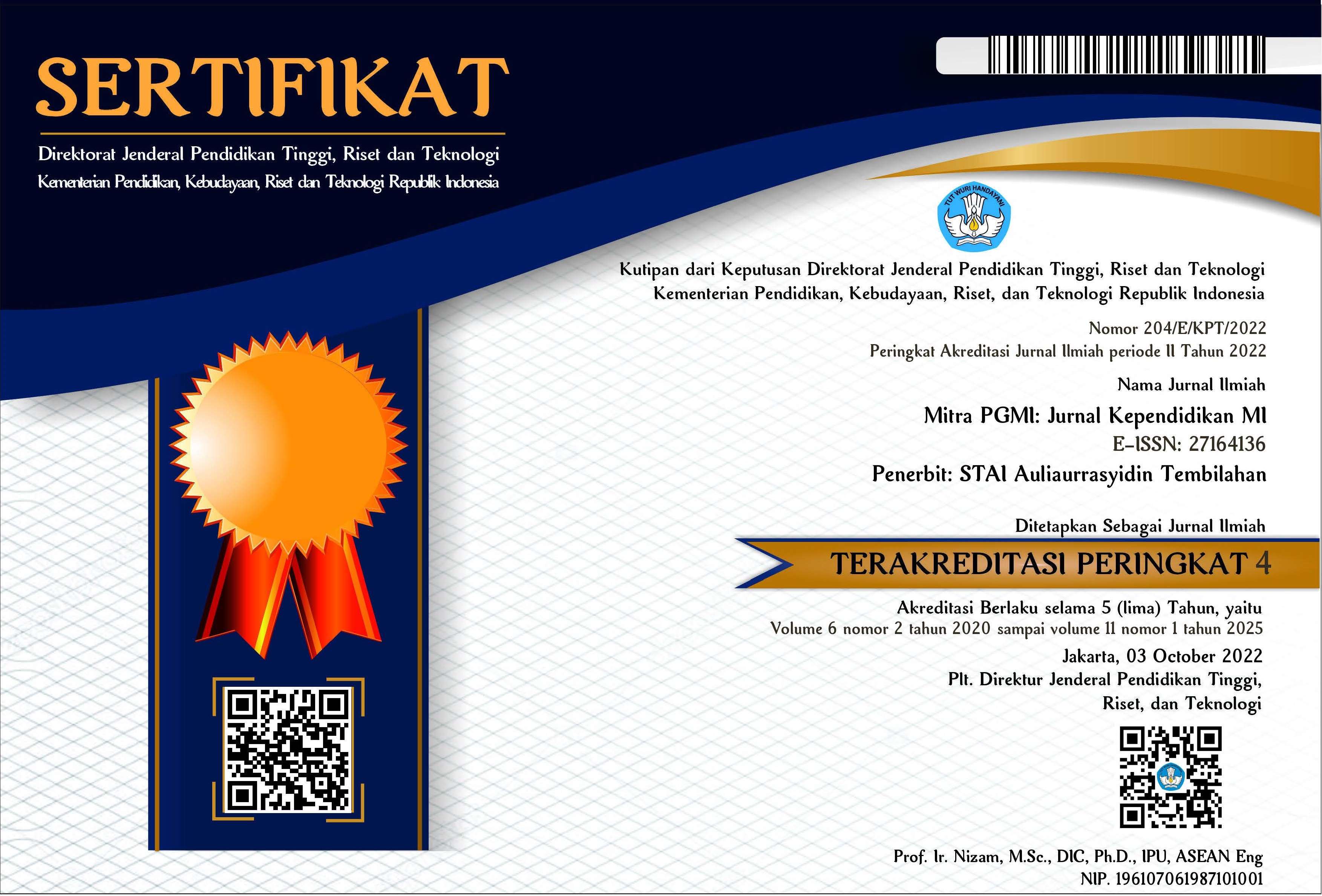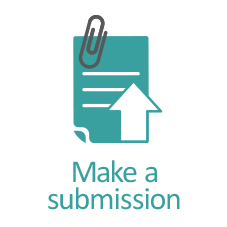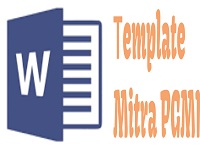Penerapan Kurikulum Merdeka Berdasarkan Teori Belajar Humanisme di Pendidikan Dasar
DOI:
https://doi.org/10.46963/mpgmi.v10i1.1641Keywords:
Curriculum, Independence, HumanisticAbstract
This research is based on the assumption of a humanistic approach which views students as complete individuals who have their own uniqueness. The humanistic approach seeks to humanize humans and help them actualize themselves through various humanistic learning methods and strategies. The research method used is a descriptive method in the form of a literature review. Data collection by collecting articles, books, documents and other references related to the independent curriculum and humanistic theoretical views collected via Google Scholar. The data analysis technique used is the content analysis method which is divided into three stages, namely data presentation, data reduction, and conclusions. The research results reveal that the independent curriculum aims to clear the minds of teachers and students and humanize those who work in the field of education. Humanistic learning theory emphasizes students' freedom in self-realization. Students' talents, interests and abilities are optimized through meaningful learning. Teachers and students work together to determine methods, objectives, materials and assessments for the learning process.
Downloads
References
Ainia, D. K. (2020). Merdeka Belajar dalam Pandangan Ki Hadjar Dewantara dan Relevansinya bagi Pengembangan Pendidikan Karakter. Jurnal Filsafat Indonesia, 95-101.
Aisyah, H., & Wiryanto. (2023). Konsep Merdeka Belajar Dalam Prespektif Teori belajar humanistik. Jurnal Ilmiah Pendidikan Dasar, 4896-4901.
Anjelina, W., Silvia, N., & Gitituati, N. (2019). Program merdeka belajar humanistik terhadap hasil belajar mahasiswa pada mata kuliah kewirausahaan . JMKSP (Jurnal Manajemen, Kepemimpinan, dan Supervisi Pendidikan), 90-110.
Aradea, H. (2019). pengaruh penerapan teori belajar humanistik terhadap hasil belajar mahasiswa pada mata kuliah kewirausahaan. JMKSP (manajemen, kepemimpinan, dan supervisi kependidikan), 90-110.
Arbayah. (2013). Model Pembelajaran Humanistik. Dinamika Ilmu , 204-220.
Baharuddin, M. M. (2009). Pendidikan Humanistik, Konsep, Teori dan Aplikasi praktis dalam dunia pendidikan. Yoygakarta: Ar-Ruzz Media.
Devi, A. D. (2021). Implementasi Teori Belajar Humanisme dalam Proses Belajar Mengajar Pendidikan Agama Islam. At-Tarbawi: Jurnal Pendidikan, Sosial dan Kebudayaan, 71-84.
Faiz, A. F., & Kurniawaty, I. (2020). Konsep Merdeka Belajar Pendidikan Indonesia Dalam Perspektif Filsafat Progresivisme. Konstruktivisme: Jurnal Pendidikan dan Pembelajaran, 155-164.
Hendri, N. (2020). Merdeka Belajar: Antara Retorika dan Implikasi . J E Tech, 1-29.
Izza, A. Z., Falah, M., & Susilawati, S. (2020). Studi Literatur: Problematika Evaluasi Pembelajaran Dalam Mencapai Tujuan Pendidikan Di Era Merdeka Belajar. Konferensi Ilmiah Pendidikan Universitas Pekalongan (Pp. 1-15). Pekalongan: Universitas Pekalongan .
Juita, D., & Yusmaridi, M. (2021). The Concept Of “Merdeka Belajar” in the Perspective of Humanistic Learning Theory. Jurnal Pendidikan Luar Sekolah (PLS), 20-30.
Juita, D., & Yusmaridi, M. (2021). The Concept of “Merdeka Belajar” in the Perspective of Humanistic Learning Theory. Jurnal Pendidikan Luar Sekolah (PLS), 20-30.
Khairiah, L. V., & Silvianetri, S. (2022). penerapan Kalo Nan Ampek dalam Proses konseling oleh seorang konselor di Sumatera Barat. Al-Isyraq: Jurnal Bimbingan, Penyuluhan, dan Konseling Islam, 1-8.
Mulyono, P. (2020, Februari Kamis). Tantangan Merdeka Belajar. Retrieved Januari Senin, 2024, from Kompas: https://www.kompas.id/baca/opini/2020/02/21/tantangan-merdeka-belajar
Nasution, A. G. (2020). Diskursus Merdeka Belajar Perspektif Pendidikan Humanisme. Semantic Scholer.
Nurjanah, E. (2021). Kesiapan Calon Guru SD dalam Implementasi Asesmen nasional. Jurnal Publikasi pendidikan Dasar, 76-85.
Prasetyo, O., & Pratomo, A. R. (2021). Evaluasi Penghapusan Ujian Sekolah berstandar nasional (USBN). Edukatif: Jurnal ilmu pendidikan, 4102-4107.
Qodir, A. (2017). Teori Belajar Humanistik Dalam Meningkatkan Prestasi Belajar Siswa. Jurnal Pedagogik, 188-202.
Rachmahana, R. S. (2008). Psikologi Humanistik dan Aplikasinya dalam Pendidikan. El-Tarbawi: jurnal Pendidikan Islam, 99-114.
Rahmawati, S. N., & Supriyanto, A. (2020). Pentingnya Kepemimpinan dan Kerjasama Tim Dalam Implementasi Manajemen Mutu Terpadu. Jurnal Dinamika Manajemen Pendidikan, 1-9.
Sabarrudin, S., Zaini, H., & Irman, I. (2022). Konsep Bimbingan Dan Konseling Islam Dalam Surah At-Tahrim Ayat 6. Al-Isyraq: Jurnal Bimbingan, Penyuluhan, dan Konseling Islam, 155-162.
Sari, E., & Noor, A. F. (2022). Kebijakan Pembelajaran Yang Merdeka: Dukungan dan kritik. Educativo: Jurnal Pendidikan, 45-53.
Sobur, A. (2003). Psikologi Umum dalam Lintasan Sejarah. Bandung: Pustaka Setia.
Suyanto. (2020, Februari 08). Kompas. Retrieved Januari Senin, 2024, from https://www.kompas.id/baca/opini/2020/02/08/implikasi-kebijakan-merdeka-belajar
Tjalla, A., Dewi, D. S., Hendrawan, T. P., & Saleh, Z. (2022). Implementasi Pendekatan Humanistik Dalam Pembelajaran Serta Penerapannya Dalam Layanan Bimbingan Dan Konseling di SMA Muhammadiyah 11 Jakarta. Jurnal Mahasiswa Bimbingan dan Konseling, 158-163.
Downloads
Published
Issue
Section
License
Copyright (c) 2024 Ulandari Safitri, Nurhizrah Gistituati

This work is licensed under a Creative Commons Attribution-ShareAlike 4.0 International License.
Authors who publish with this journal agree to the following terms:
1. Copyright on any article is retained by the author(s).
2. The author grants the journal, right of first publication with the work simultaneously licensed under a Creative Commons Attribution shareAlike 4.0 International License that allows others to share the work with an acknowledgment of the work’s authorship and initial publication in this journal.
3. Authors are able to enter into separate, additional contractual arrangements for the non-exclusive distribution of the journal’s published version of the work (e.g., post it to an institutional repository or publish it in a book), with an acknowledgment of its initial publication in this journal.
4. Authors are permitted and encouraged to post their work online (e.g., in institutional repositories or on their website) prior to and during the submission process, as it can lead to productive exchanges, as well as earlier and greater citation of published work.
5. The article and any associated published material is distributed under the Creative Commons Attribution-ShareAlike 4.0 International License








2.png)


